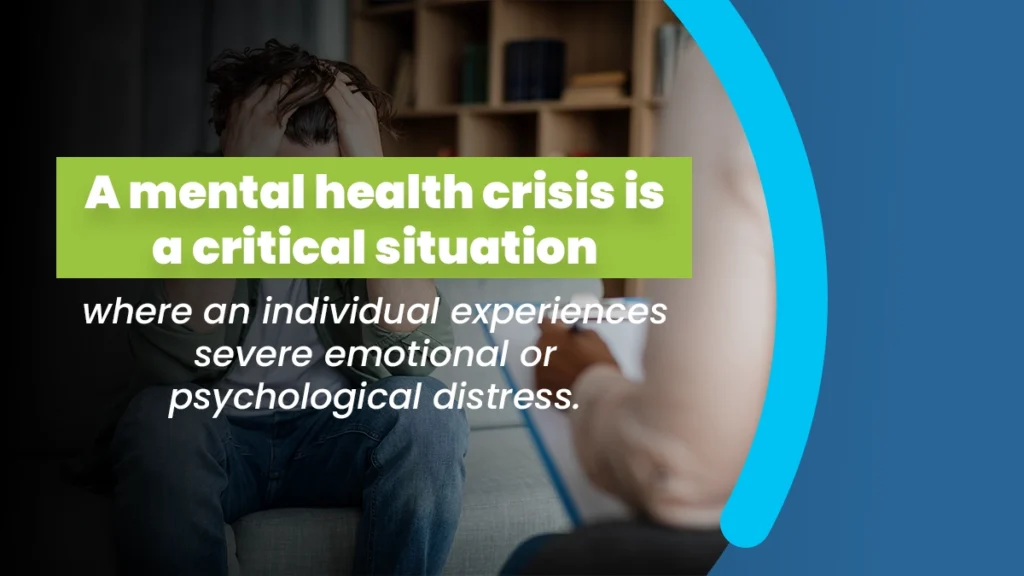Mental health crises can happen unexpectedly and intensely, causing distress for individuals and their families. Knowing what these crises involve is essential for providing proper support and response. By understanding the basics, we can better manage and reduce their impact.
In this blog, we’ll explore the essential insights into the mental health crisis. Read on to discover what contributes to this crisis, how it impacts daily life, and the actions we can take to address it.
Key Takeaways
The mental health crisis is a critical issue impacting countless lives, demanding immediate attention and solutions. Read on to discover:
- Symptoms of a mental health crisis range from severe anxiety and depression to drastic mood swings.
- There are various types of mental health crises, each requiring specific approaches and interventions.
- Management strategies for a mental health crisis include immediate support and crisis intervention techniques.
The Haven Detox-New England offers various services to manage mental health crises. Call us at (844) 933-4145 for more details.

Importance Of Recognizing A Mental Health Crisis
Recognizing a mental health crisis is crucial for timely intervention. Spotting the signs early helps prevent worsening conditions. Symptoms like intense mood swings, withdrawal from social activities, or extreme anxiety indicate a crisis. Quick action can provide the needed support and prevent further harm.
Addressing a mental health crisis involves understanding the individual’s specific needs. Effective recognition includes observing changes in behavior and emotional state. Support can then be tailored to meet those needs, offering comfort and resources. Proper intervention can lead to better outcomes and recovery.
Involving mental health professionals is vital to managing a crisis. They provide essential expert guidance and treatment options. Professional help ensures that individuals receive the appropriate care and support. Recognizing and addressing a crisis promptly enhances the chance of effective treatment.
Defining A Mental Health Crisis
A mental health crisis is an urgent situation involving severe mental health problems. It often includes thoughts of suicide, self-harm, or violent behavior. People experiencing a crisis may face immediate danger to themselves or others. This condition requires immediate help from the community or medical professionals.
What Constitutes A Crisis?
Sudden, intense mental health conditions can define a crisis. These include a mental breakdown or suicidal ideation. Abrupt changes, traumatic experiences, or natural disasters can trigger a crisis. Such situations disrupt daily life and need prompt intervention to prevent severe outcomes.
Common Triggers And Causes
Common triggers for a mental health crisis include traumatic experiences or abrupt life changes. Other causes are severe mental illness, like depression or anxiety. Natural disasters and self-harm also play a role. Identifying these triggers helps in managing and preventing mental health emergencies effectively.
Symptoms And Indicators
Recognizing the symptoms of a mental health crisis is crucial for timely intervention. These signs, which can manifest in behavioral, cognitive, and physical changes, indicate when someone may be struggling with severe mental health conditions. Identifying these indicators early helps provide the proper support and prevent escalation into more serious issues.
Behavioral Symptoms
Behavioral symptoms of a mental health crisis include sudden changes in a person’s behavior. This can involve extreme mood swings, withdrawal from family and friends, or engaging in risky activities. Substance abuse or neglecting responsibilities may also be evident. These signs indicate severe mental health conditions.
Cognitive Symptoms
Cognitive symptoms of a mental health crisis affect how a person thinks. This may involve confusion, disorientation, or severe difficulty concentrating. Suicidal thoughts or irrational beliefs can also occur. Mental disorders can lead to a person’s inability to make clear decisions, impacting daily life and responsibilities.
Physical Symptoms
Physical symptoms during a mental health crisis include changes in physical health. This can be frequent headaches, severe fatigue, or changes in appetite. Unexplained aches or a sudden drop in personal hygiene are common. These signs may also signal underlying medical conditions or substance use disorders.
Types Of Mental Health Crises
Mental health crises vary in type and severity. These situations can impact individuals of all ages, including family members. Understanding the different types helps in identifying warning signs early. The goal is to address these issues promptly, as they can escalate within hours, days, or weeks.
Acute Crisis
An acute mental health crisis involves sudden, severe changes in behavior or emotions. These situations require immediate intervention due to the risk of harm. Adults and youth may experience a nervous breakdown, often showing an abrupt change in their abilities. Recognizing these signs early is crucial for adequate support.
Chronic Crisis
A chronic crisis develops over an extended period, often weeks or months. The individual’s behaviors may worsen gradually, affecting daily life and relationships. Family members and others must stay alert to ongoing warning signs. Early intervention can help manage the situation and prevent escalation.
Episodic Crisis
Episodic crises involve recurring mental health issues, where periods of stability are interrupted by sudden declines. These crises may occur unpredictably, creating stress for the individual and their family. Recognizing patterns and signs can help in preparing for and managing these mental health crises effectively.
Immediate Steps To Take
Contact mental health services immediately during a mental health crisis. Use crisis services for urgent support, including the crisis lifeline and emergency services. Access reliable information to guide your actions. Time is critical; act quickly to connect with mental health care.
How To Respond To A Crisis
Responding to a mental health crisis requires clear steps. Stay calm and assess the situation:
- Contact the crisis intervention team.
- Provide accurate information when reaching out for help.
- In addition, ensure the person’s safety until professional help arrives.
Emergency Contacts And Resources
Keep emergency contacts and resources readily available. Include mental health crisis services, the National Alliance on Mental Illness (NAMI), and the American Psychological Association. These tools offer vital information. Countries often provide specific resources, so be familiar with local mental health care options for timely intervention.
Long-Term Strategies For Management
Managing a mental health crisis long-term requires consistent support and planning. Developing a strong support network, including family, friends, and professionals, is essential. Regular therapy sessions and medication, if prescribed, can help stabilize mental health. Having a crisis plan in place ensures quick action when needed.
Healthy lifestyle choices play a vital role in long-term management. Regular exercise, balanced nutrition, and adequate sleep help maintain mental well-being. Stress management techniques, like mindfulness and meditation, also reduce the risk of future crises. Consistent self-care promotes lasting recovery and resilience.
Monitoring progress and adjusting strategies as needed is crucial. Regularly reviewing and updating your mental health plan helps address changing needs. Staying connected with support systems ensures ongoing assistance. Adapting to new challenges while maintaining healthy routines supports long-term stability.
Frequently Asked Questions (FAQs)
What can a mental health crisis look like?
A mental health crisis can manifest as overwhelming emotions, intense anxiety, or severe depression. Individuals may experience panic attacks, extreme mood swings, or thoughts of self-harm. They might withdraw from others, struggle to think clearly, or cannot cope with daily life.
These crises can lead to irrational behavior or an inability to function normally. Immediate support and professional intervention are crucial to help manage the situation and guide the individual toward safety and recovery.
What are the common signs of a mental health crisis?
Common signs of a mental health crisis include severe mood swings, intense anxiety, and social withdrawal. Individuals might struggle with daily tasks, showing a noticeable decline in work or school performance.
They may also exhibit sudden behavioral changes, confusion, or feelings of hopelessness. Talking about self-harm or suicide is a critical warning sign that needs immediate attention. Recognizing these signs early can help prevent the situation from worsening and ensure timely support.
Find Immediate Help At The Haven Detox-New England
If you or someone you know is experiencing a mental health crisis, don’t wait for the situation to escalate. Reach out to The Haven Detox-New England today for expert guidance and immediate support.
Our mental health treatment is comprised of comprehensive care that addresses the psychological and emotional needs of individuals through therapy and support. We also offer residential treatment, an immersive program providing 24/7 care in a supportive environment for individuals requiring intensive, long-term treatment.
Our team comprises highly trained mental health professionals dedicated to providing compassionate, effective care tailored to each individual’s needs.
Contact us at (844) 933-4145 to learn how we can help you navigate this challenging time and pave the way toward healing and stability.
Verify Insurance
Let’s get you or a loved one help with a few simple steps.




